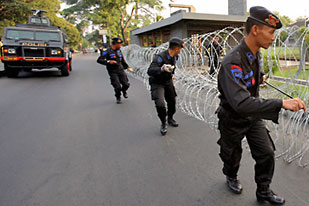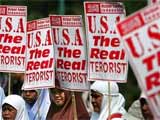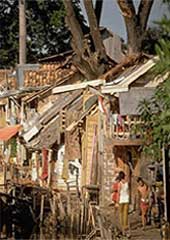By Andre Vltchek
These days Indonesia is hardly a country in which George W Bush would enjoy taking a relaxing stroll and talking to the people. Not that there are many places left for walking anyway: almost everything has been privatized and Jakarta has almost no public parks or even decent sidewalks. But let’s imagine that he were to find some quiet promenade, get out of the car surrounded by his Security detail, take a few steps on Indonesian soil. He would risk being reviled, insulted, perhaps even attacked.

Tens of thousands of Muslims
protested the visit
So what brought him to the largest Islamic country in the world, despite polls suggesting that just 30 percent of Indonesians view his country favorably, down from 75 percent just six years ago? Below I suggest some possible answers.
The visit was flawlessly orchestrated by U.S. and Indonesian Security Services, building on their longterm relationship. Landing at the secondary Halim Airport located in dirt poor East Jakarta, Bush stepped on Indonesian soil just to transfer from Air Force One to the Presidential Black Hawk, which brought him to the city of Bogor, some 40 miles south of the capital, almost to the doorsteps of Bogor Palace. The Palace, one of the symbols of Dutch colonial rule, is also where deposed President Sukarno spent his last years under house arrest following the 1965 U.S.-sponsored coup and the bloody pogrom that followed in its wake.
Upon arrival at the palace, after a brief photo session at the entrance, Bush proceeded to one of the halls still decorated by the portrait of (theoretically) ousted dictator Suharto. The U.S. president offered this appraisal of Indonesia: “”It’s very important for the people of America to understand that this vast country has got tremendous potential… It’s got a prominent role to play in the world in showing how it’s possible for people to be able to live together in peace and harmony… I admire Indonesia’s pluralism and its diversity. I admire your president, his commitment to reform and strengthening democracy.” The remarks suggest that the visit, in the end reduced to a mere six hours, was primarily for U.S. consumption, with the Iraq War ever to the fore.

The official photo. With Indonesian President Susilo
Bambang Yudhoyono
Not unlike most of the U.S. mass media, the president, whatever his own evident discomfort, loves to use positive clichés, presenting Indonesia as the living proof that Islam and democracy can coexist. By some unfathomable logic, Indonesia, as the world’s largest Islamic nation, should demonstrate that Iraq and Afghanistan still have a chance and that his decision to invade them was fully justified.
One big (but by no means the only) problem, however, is that Indonesia is far from democratic and hardly tolerant or pluralistic. Hundreds of churches are burned down every year and the state allows only a handful of ‘officially accepted religions’ and followers must have their religious affiliation engraved on individual ID cards. Unconstitutional, oppressive and medieval ‘sharia’ by-laws are enforced in several parts of the country. Some three hundred thousand members of the Chinese minority, those who refuse to change their names to Indonesian ones and fully deny their own identity, have no rights or citizenship.
Human rights activists are intimidated or even murdered by the state apparatus. The most striking example of this is the case of Mr. Munir who was poisoned on board Garuda, the Indonesian airline. Some members of progressive movements and political parties (including the People’s Democratic Party) are still ‘disappeared’ with no evidence of their imprisonment or death four decades after the 1965 coup. No apology or compensation was ever given to the millions who suffered imprisonment, detention, interrogation or torture following the military coup. History is still manipulated and perverted, blaming the coup on the Communist Party (PKI). Those who died in the aftermath of the coup (informed estimates range between five hundred thousand and three million) have never been rehabilitated, a further source of pain for their loved ones. Neither the suffering of the victims of genocide in East Timor nor the mass murders in Papua, Aceh, and Ambon have ever been openly acknowledged: no military official has received a lengthy sentence.
While the number of those who are considered extremely poor living on less than one dollar a day is increasing from present levels of 25 percent of the population (even according to understated official Indonesian statistics), the middle class is dramatically shrinking. Indonesia is becoming a polarized nation of a few ‘haves’ and huge numbers of ‘have nots’. Not one political party in the last elections dared to criticize the extreme pro-market system. Unions exist to defend owners against employees. Virtually the entire public sphere has disappeared: even water is privatized, a fact which may soon lead to one of the gravest humanitarian disasters in Southeast Asia. Indonesia has one of the lowest life expectancy rates in the region. The mass media, owned by large conglomerates, stubbornly refuses to challenge or even discuss this unsustainable, hopelessly corrupt and inhumane system.
This is the country which Mr. Bush hailed as pluralistic and democratic; a country which the U.S. Secretary of State previously described as “our friend”. For its part, the U.S. media raised no serious questions. The New York Times claimed that: “…Since Suharto’s departure from power in 1998, a real democracy has begun to take root. In its recent report card on the country, Freedom House judged that ‘the political system is open and democratic in its basic structures’, even while some of its institutions still ‘function poorly or are sanctuaries of undemocratic and abusive behavior’.”
The lack of a critical U.S. stance toward Indonesia is hardly surprising. Not only did the CIA play a key role in the coup, but during Suharto’s dictatorship, western mining and oil companies acquired extremely favorable conditions for operating in this sprawling and naturally rich archipelago. Since Suharto was forced to step down, corruption has become even more rampant. (Transparency International continuously rates Indonesia as one of the most corrupt nations on earth). Indonesia has also become a limitless source of cheap, unorganized and unprotected labor. None of these issues were raised by Bush or the media in Indonesia or the United States during his brief touchdown in Indonesia.
Talks between the U.S. and Indonesian presidents held behind closed doors are said to have included a U.S. offer to help with an outbreak of bird-flu epidemic. The U.S. also expressed willingness to launch small programs to aid Indonesian schools and promote growth.
Meanwhile, Bogor Palace was encircled by four layers of barbed wire with some twenty thousand police and military personnel deployed to ensure security of the two leaders. Thousands of demonstrators were kept at bay in both Jakarta and Bogor.

Bogor Palace surrounded by barbed wire
“We came here to see Bush”, lamented one old woman who traveled from a nearby village. “But all we were shown was the army.”
Massive demonstrations rocked the capital and the city of Bogor for several days. They were mainly organized by hard-core Islamic parties with slogans ranging from “Bush is a Jewish puppet” to “Bush is the real terrorist”. But others present included “Anti-Imperialist Masses” and Green Peace.

Muslim women protest at the US embassy
The U.S. had not historically been viewed here as ‘the enemy of Islam”. Recent protests and anti-American sentiments are the direct result of current U.S. policy in the Middle East, especially the invasions in Afghanistan and Iraq and unswerving support for Israel. In the past, the main goal of Islamists was to destroy the Communist Party (PKI) and all other progressive and “atheist” movements. The carnage that resulted also destroyed the hopes for secularism in Indonesia. The U.S. ‘helping hand’ for the dictatorship in 1965 and since made it a staunch ally of the oppressive system whose multiple elements include the growing power of Islam. It has continued to back successive Indonesian governments ever since, with scant regard for the oppression of the Indonesia people or the implications of a resurgent Islam.
Andre Vltchek is a novelist, journalist and filmmaker, co-founder of Mainstay Press publishing house for political fiction. His recent books include the novel Point of No Return and a collection of political essays Western Terror: From Potosi to Baghdad. He is the producer of a documentary film about the Suharto dictatorship and its impact on present-day Indonesia ‘Terlena – Breaking of a Nation’. A senior fellow at the Oakland Institute he lives and works in Southeast Asia and South Pacific and can be reached at: [email protected]. Posted at Japan Focus on November 21, 2006.



